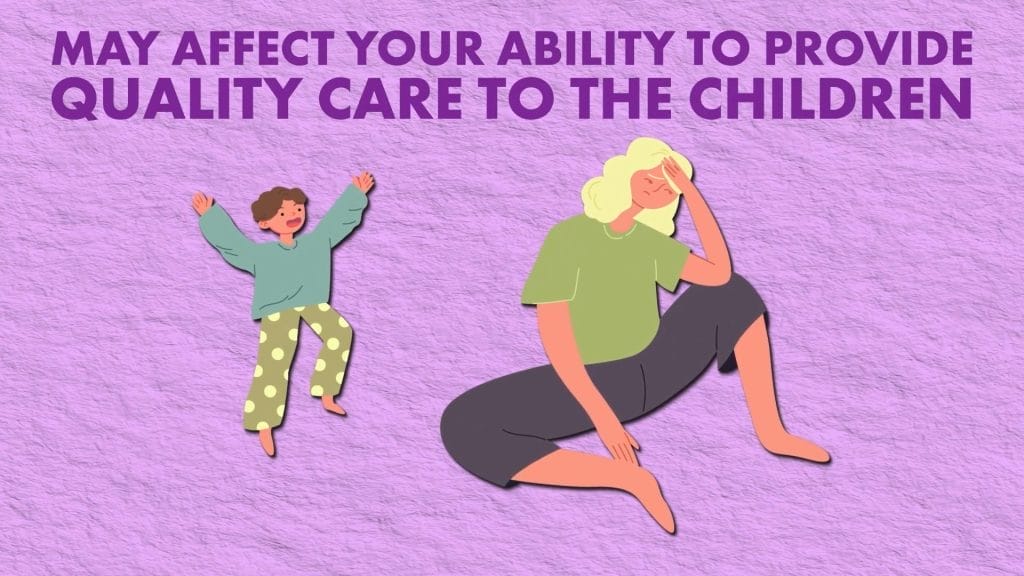Hi everyone! It’s Nea with Nanny Parent Connection back with this week’s video.
Being a nanny is a rewarding but demanding job. The responsibility of caring for someone else’s children comes with its own set of challenges, and sometimes, it can lead to burnout.
In today’s video, we’ll explore the signs of nanny burnout and provide some practical solutions for nannies to maintain a healthy work-life balance.
Parents – if you are currently working with a nanny, please share this article with them.
Click the button below to watch and we hope you find this useful!
If you found this video helpful, please subscribe on YouTube and share it with your friends. Also, please take a moment to check out the other videos we have published on YouTube.
We’d love to hear any comments about how we can improve these videos as well as your ideas on topics you’d like to see me cover in the future. Just comment below!
If you aren’t currently a member of our community, we’d love to have you join. Nannies can join our community totally FREE and our Family/Parent memberships start at only $8.99/month!
Don’t forget, you can reach us directly via email by clicking here or by calling/texting (425) 243-7032 if we can help you.
A transcript of the video can be found below:
Hi everyone, it’s Nea with Nanny Parent Connection, back with this week’s video.
Working as a nanny is a rewarding but demanding job.
The responsibility of caring for someone else’s children comes with its own set of challenges, and sometimes it can lead to burnout.
In today’s video, we’ll explore the signs of nanny burnout and provide some practical solutions for nannies to maintain a healthy work-life balance.
Signs of Nanny Burnout
Constant fatigue: If you find yourself feeling tired all the time, even after a good night’s sleep, it could be a sign of burnout.
Constant exhaustion may affect your ability to provide quality care to the children.
Emotional exhaustion: Nannies often form strong bonds with the children they care for.
If you notice a decrease in your emotional energy or find it challenging to connect with the kids on an emotional level, it might be a sign of burnout.
Lack of motivation: If tasks that used to bring you joy and satisfaction now feel like a burden, it’s a clear indication of burnout.
This lack of motivation can extend to both work-related and personal activities.
Irritability and impatience: Burnout can make even the most patient individuals irritable.
If you find yourself becoming easily frustrated or lacking patience with the children, it’s time to address the burnout.
Physical symptoms: Headaches, digestive issues, and other physical symptoms can manifest as a result of chronic stress.
Ignoring these signs can lead to further health issues.
If you find yourself experiencing some or all of these symptoms, or if you are a parent that is noticing these signs in your nanny, here are some ideas to consider:
Solutions for Nanny Burnout
Open communication: Establish open communication with the parents or employers.
Discuss your workload concerns and the need for occasional breaks to recharge.
They may be more understanding and willing to adjust schedules or responsibilities.
Same goes for the parents if you notice that your nanny seems to be burnt out. Politely and respectfully communicate.
Set boundaries: It’s crucial to set clear boundaries between work and personal life.
Define specific working hours and stick to them.
Avoid taking work-related calls or responding to messages during your off hours.
Remember, nannies, your personal time is yours to spend how you like.
Self-care: Prioritize self-care to recharge your physical and emotional batteries.
Take breaks, get enough sleep, engage in activities you enjoy, and make time for hobbies.
One tip our team shares is to get out of your element. Take a long drive, go for a hike, or head out of town for the weekend.
It’s amazing what a change of scenery can do for your mental health.
Delegate tasks: If possible, delegate some tasks that lighten your workload.
Whether it’s sharing responsibilities with another caregiver or involving older children in age-appropriate chores.
Distributing tasks can ease the burden.
Make sure to discuss this with the parents if you feel that your job duties need to be reduced or changed.
Professional support: Consider seeking support from professional networks or organizations that cater to nannies.
Connecting with others in similar roles can provide a valuable support system and helpful advice.
You may want to check out the US Nanny Association for resources.
Regular check-ins: Regularly check in with yourself to assess your well-being.
Reflect on your emotions, stress levels, and overall satisfaction.
Identifying burnout early allows for timely intervention. Nanny burnout is a real challenge, but recognizing the signs and taking proactive steps can make a significant difference.
By fostering open communication, setting boundaries, prioritizing self-care, and seeking support when needed, nannies can create a healthier work-life balance.
Ultimately, a happy and well-supported nanny contributes to a positive environment for both the children and themselves.
We hope you found this video helpful and informative. If you did, please click the like button, subscribe, and ring the bell.
Also, make sure that you don’t miss this video: “Top 10 Tips for How to Keep Your Nanny”.
Talk with you next week. Bye!

